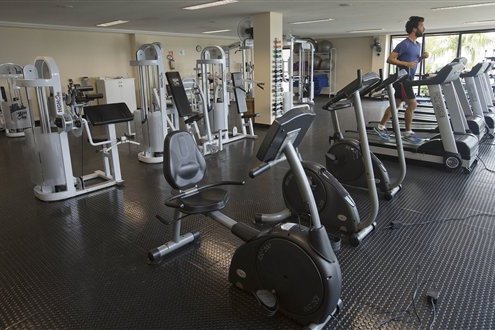
January 22, 2015
 Andre Penner/AP
Andre Penner/AP
A guest exercises on a treadmill in the fitness room at the Paradise Golf & Lake Resort, the hotel where Belgium's 2014 World Cup team will stay during the World Cup in Mogi das Cruzes, Brazil, Friday, Feb. 14, 2014.
Folks may have their New Years Resolution priorities straight the first two weeks of January, but data shows that things start to change the third week of January.
Working out, losing weight and getting in shape are the single most common New Years Resolutions — a University of Scranton study found that 2014's number-one resolution was to lose weight.
While gym memberships and check-ins on social media go up by 50 percent in January, that trend usually doesn't last. Part of the reason for the dip in gym usage could be because it takes 66 days to form a habit, the Wall Street Journal reports.
According to data from gym check-ins, the WSJ reports that while gym activity starts going down the third week of January and dips in February, it spikes again — higher than before with 4 million check-ins — in March. But that doesn't last either. It tapers off slowly throughout the year and bottoms out during November, with 3.3 million check-ins.
There is a silver lining, however. Setting specific goals — including more realistic ones — can help you stick to your rosolution. New York University psychology professor Peter Gollwitzer said that planning when, where and how you take action can make things take a turn for the better. That way, you can create associations that make working out feel more natural. The example Gollwitzer gives is going for a run after morning coffee on weekends.
“What we find is that it’s no longer you who controls the behavior,” Dr. Gollwitzer says. “The situation triggers the action.”
Letting a friend in on your resolution can help you stick to it, but broadcasting it can hurt you. Gollwitzer said that continually broadcasting things may give folks a sense of accomplishment without actually accomplishing anything. Gollwitzer conducted a study to prove his theory, the WSJ reported.
One of the four groups that Gollwitzer and his co-authors studied was law students. Those who told others about their intentions — like reading law periodicals regularly — said they felt closer to becoming a lawyer than those whose intentions stayed private. The act of making their intentions public gave them a premature sense of completion, the researchers concluded.
For the complete story, click here.